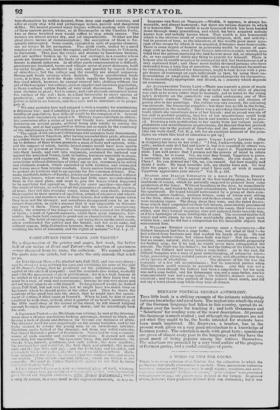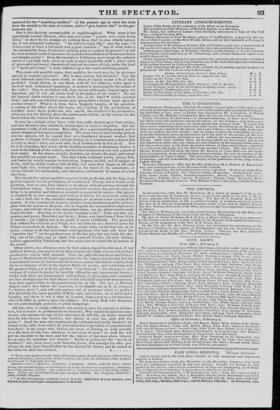A WORD OR TWO FOR COOKS.
THERE is no surer criterion of civilization than the estimation in which the profession; Lhat chiefly characterize it are held. Thus, amongstour barbarous ancestors, surgeons and lawyers were in small repute ; nmsicians and architects wet a eliminated " fiddlers and ni etaj" "poor scholarswere presented with a lieenee to beg; and player., were ordered to the buttery. In process of time; however, these professors attained their due distinction ; but it was
reserved for the " marching intellect" of the present age to raise the cook from the menial to the man of science, and to " give honour duo" to the gastronomic art.
Nor is this decision unreasonable or unphilosophical. What were it but ingratitude towards Heaven, after man was given " power over every living thing," to show by his manner of cooking them that he was utterly unworthy of the delegated authority. " In order to enjoy life," says tho sage, " it is necessary to have a had heart and a good stomach ; " but of what avail is his inestimable boon, if you have nothing good to employ its powers ? or will the best stomach retain its goodness boa" under the infliction of ill-dressed dishes and doughy pastry ? Even the staunchest Utilitarian must assign the culinary artiste a very high rank, when he calls to mind (probably with a bitter sense of personal experience) the waste of national resources which, under the head of " spoilt provision," is daily inflicted upon this much-enduring people.
The cynic will possibly argue, that, useful as the cook may be, he ministers merely to sensual enjoyments. But is man nothing but intellect ? Can the most ethereal mind live upon itself, or retain its vigour under a fit of indigestion ? Could Byron, or can Scott, with all his indus:ry, write upon a meal of lead, nicknamed dumplings, or mutton in mourning for the crimes of the cook ? Nay, to go higher still, does not our philosophy depend upon our digestion, and is not our virtue itself in the power of otur cooks ? Do not the learned doubt whether it was black bile or the Devil * which irritated Saul ? and who can tell what events may spring from a hearty meal upon illcooked dishes? What is it, then, but a beggarly begging of the question, a setting of the effect above the cause, and a raising of the productions of intellect above those professors who enable the intellect to be productive, when we rate the literary above the gastronomic artiste, or the caterer for the head before the caterer for the stomach.
It may be—indeed it has been said, that cooks destroy more than armies, and that therefore they should be discouraged on motives of policy. But this argument is idle, if not untrue. Man after all is a gormandizing, animal, and is never temperate but upon compulsion. We must choose between the glutton and the epicure, till an injured liver or a disordered stomach renders him perforce a disciple of Cornaro (whose luxury, be it remembered, reduced him at forty to death's door, and who only lived abstemiously to live at all. Nor let it be forgotten, that nearly all the healthy examples of abstinence lived as it were in the infancy of the science, and that their temperance was only a proof of their taste). In the choice of evils, therefore, let us take the least, and retard the mischief we cannot avert., The man whom soddened pastry, greasy fish, and burnt fat, would consign to starvation, languor, acidity, and ill temper at thirty, shall by skilful cookery last till fifty, and even then linger on till sixty upon light diet, without hurling missiles at the heads of his attendants, or
eating himself into melancholy, and becoming sentimental by means of a bad digestion.
Nor should the various qualities required in the professor, and the long, long period requisite for his Production, be overlooked. Poetry, and it would seem painting, start at once from infancy to manhood, without passing through the intermediate stages. In the more experimental sciences, the growth of knowledge is so gradual, and laborious research so essential to success, that genius is crushed by its own armour, and nothing is left for the most acute mind but to add a fresh star to the countless catalogue, or to invent a new system of the
nerves. It was reserved for cookery alone to unite the learning of the philosopher with the genius of the poet, and to require the accumulated experience
of ages, and tributes from every ransacked clime, ere the gifted mortal could begin his task. And thus it was in the "antique world." Arms and arts, elo quence and poesy, flourished and faded ; Rome was transformed from brick to marble ; yet cookery was in its youth, if not its childhood. The gestation that sufficed for a Caesar or a Virgil, was too little by two hundred years for Nature to produce an Apidus. He rose at last when civilization was at its acme, a union of all that refinement could produce, who had only tried her " prentice han' " on his predecessors of the fine arts, but sent forth this dar ling son of her riper age to stand like a second Codes, her only defence against approaching Vandalism, her last endeavour to retard the barbarism of the world.
Other artists, too, whatever may be their object, appeal to cultivated, if not artificial feelings, and require from theiradmirers the study of years before their productions can be fully relished. Thus the palpable raw-heads and bloody_ bores of Macbeth are far better appreciated by the vulgar, than the last few but transcendent scenes of that wonderful dram a,—scenes alternately ranging from the level dialogue of life to the highest flights of poetry, and exhibiting with the greatest truth, vet with the greatest "smoothnesst ", the abruptness and violence of a mind distracted by worldly difficulties and supernatural terrors ; whilst with these are intermingled outbreakings of philosophy and sentiment not less distinguished for their fitness to the individual character and occasion, than their applicability to the general purposes of life. Set, too, a Michael Angelo and a tyro before the Laocoon, or let Ratfael and an R. A. compose "a history piece ", and will nine persons out of ten know which to prefer ? But distribute the same quantity of flour, suet, and raisins, to an artist and a bungler, and there is not a man in London, from a lord to a day-labourer, who will differ in opinion upon the subject. Yet every drab who disgraces the art unhesitatingly pretends to plum dumplings.
All this, then, is surely sufficient, not merely to raise the science to distinction, but to rescue its professors from obscurity. Why should the laborious mechanic, who pleases the eye by his imitations of still life, be better received than he who dresses the realities, and charms at once the sight and the palate ? Shall the man who represents the rubicund and portly landlord be
ignominiously banished? at the table from which he who raised that corporation is
banished ? Is the singer who tickles our sense of hearing to walk proudly over the head of him who ministers to our sense of taste ? or shall the wit put his shoulder to the door, and bar the ingress of the man whose labours are at once his stimulant and reward ? Forbid it justice and the "much of intellect I" Let, then, every cook hereafter know, that amongst his other pri vileges he may dress himself after he has dressed his dinner, and be seated at the table his skill has covered.
* "Nam cum spiritu erroris Saul affligeretur, chine David assisteret, cithara laborantem deliniens, lancea cum ferire cunatus est, nisi, he lethalem ictum propere declinasset."—Sufpicins SeverliS. erroris.] —Hebnei„Tosephus, Cajetanus, Delrio, censent fnisse atrium bilem, sive melancholiam et 54%14t,C, gum_ in Soule causabatur snspiciones, invidiam, nuerorem, furores, deliria. Alit censent fnisse Angehun bunion a Deo Saudi sum. Venus est Diabolum fuisse qui occupat Saulem. Ito Josephast IsidorasAbel, Vatabl. Theodor.
I " In the very torrent, tempest, and as it were, whirlwind of your passion, you should acquire and beget a smoothuess,"--liamiet.



















 Previous page
Previous page